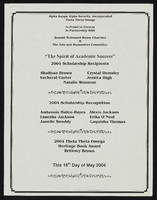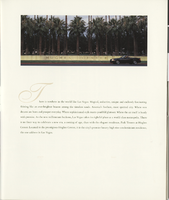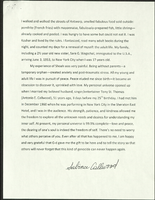Search the Special Collections and Archives Portal
Search Results

Alpha Kappa Alpha Sorority, Theta Theta Omega Chapter scholarship program documents
Date
Archival Collection
Description
From the Alpha Kappa Alpha Sorority, Incorporated, Theta Theta Omega Chapter Records (MS-01014) -- Chapter records file.
Text

Rosemary Q. Flores interview, October 16, 2018, October 29, 2018: transcript
Date
Archival Collection
Description
Session 1: Interviewed by Elsa Lopez. Rosemary's parents originated from Sonora, Mexico where her father worked in the strawberry fields and her mother was a kindergarten teacher. Her father, in search for a better life, came to Nevada after he heard of jobs available in the Northern Nevada mines. The two met and settled down in Reno after her mother became enamored with the beauty of Lake Tahoe. Rosemary and her four younger siblings grew up in Reno with their parents until the divorce. Her father soon joined the army during the Korean war and felt that it would be best if Rosemary and her siblings lived with their grandmother back in Mexico. There they stayed for two years, and although she missed her family and did not speak much Spanish, she recalls her time there with fondness. She eventually moved back to Reno and finished high school, graduating in the top 20. She married afterwards and had her son as well. After some convincing from her husband, Rosemary enrolled into the University of Nevada, Reno and graduated with a major in Secondary Education with a specialty in Physics and Math. Rosemary became further involved in community outreach and non-profit programs such as Founding Hispanic Youth Image, Co-founding ALITAS, being a board member for the Title XX Commission, and being a Chair for the Latino Youth Leadership Conference. She has two children and is currently working at UNLV with the program Multicultural Education Services Alliance (MESA) as a Family Engagement Specialist. Subjects: Reno Nevada, UNLV, Multicultural Education, Family Engagement, Activism; Session 2: Interviewed by Elsa Lopez. This is a continuation of a previous interview. We have asked Rosemary Q. Flores to tell us more about her work in the Multicultural Education Services Alliance. We also spoke more about her family and early childhood in Mexico while she was away from her family.
Text

Transcript of interview with Nora Luna by Maribel Estrada Calderón, November 7, 2018
Date
Archival Collection
Description
Nora Luna (1971 - ), the daughter of Mexican immigrants, recalls her growing up experience in the Las Vegas Valley. During her childhood, she and her siblings frequently persuaded their father to take them out to eat to the Circus Circus buffet. She enjoyed playing the carnival games at the Circus Circus. She attended Las Vegas High School. In 1994, she graduated from UNLV with a degree in criminal justice. Her education inspired her to work with the community’s youth. She tutored children at the Y.M.C.A. of Southern Nevada. Luna also worked for a program, Anahuac, which sought to deconstruct some of the myths that often prevent Latinos from attending college. In Reno, Nevada she worked with non-profit organizations to implement evidence-based practices for youth development. Luna has worked for Nathan Adelson Hospice as the Director of Diversity and Grant Funding since 2008. She seeks to find culturally competent care for Latinos and ensures that the hospice provides informational r
Text

Valorie Vega interview, November 19, 2018: transcript
Date
Archival Collection
Description
Interviewed by Laurents Bañuelos-Benitez. Barbara Tabach also participates in the questioning. Valorie J Vega was born in raised in Los Angeles County. Her father, Fred Vega, was one of the first firefighters hired in the Los Angeles County area. Vega was one of three children, and remembers spending her childhood surrounded by family. In college, Vega began studying biology only to realize that she was better suited studying Spanish. Upon completion of her undergrad, Vega went on to earn a Master's in Spanish interpretation. As a result of her studies, Vega was able to secure a job in the Court Interpreter program in Las Vegas, moving here in 1978. Her position in the interpreter program, led her to pursue a degree in law which in turn led to a successful career as a lawyer and a judge.
Text

Maria Casas interview, June 12, 2019: transcript
Date
Archival Collection
Description
Interviewed by Maribel Estrada Calderón. Farmersville is described as a small town between, Exeter and Visalia, California populated by Mexican American farm workers. It is in this small town, where UNLV History Professor Maria Raquél Casas spent her childhood raised along with her sisters and brothers. In her interview, Dr. Casas describes how growing up in this small town with her traditional Mexican family influenced the person she is today. While working alongside her family in the fields, Dr. Casas decided that she would strive to obtain an education. Through hard work and constant support from her sister, Dr. Casas attended Fresno State, where she discovered her love for history. Upon completing her undergraduate program, Dr. Casas made the decision to further her education by pursuing a master's at Cornell University. At Cornell, she faced discouraging professors who believed she would not be able to complete the master's program let alone pursue a PhD program. Despite these demoralizing professors, Dr. Casas completed her program and was admitted into University of California Santa Barbara's history program. Dr. Casas never forgot her roots or the significance of her presence in the majority white academic spaces she attended during her academic journey. When she arrived at UNLV, she continued to strive for more Latino representation in both the student population and in the school faculty. During her tenure at UNLV, Dr. Casas has served as an advisor for multiple Latino student organizations including MEChA and SoL. Dr. Casas has witnessed much progress in Latino representation at UNLV, but she believes there is still much work left to be accomplished.
Text

Felipé Goodan interview, April 1, 2019: transcript
Date
Archival Collection
Description
Interviewed by Monserrath Hernández. Rabbi at Temple Beth Sholom since 1998, Felipe Goodman is a native of Mexico City. He identifies as a Mexican Jewish American, and shares the complexities of these.
Text

John Robinson Pacheco interview, June 24, 2019: transcript
Date
Archival Collection
Description
Interviewed by Laurents Bañuelos-Benitez. John Pacheco's father, Francisco, arrived in Las Vegas in 1942. John was born in 1947 and raised mostly on 27th Street. He is a graduate of Rancho High School and UNLV. He is a retired artist known for hand-painting signage for many local businesses. As a very civic minded person, John has received many local awards and served on committees for the Las Vegas Chamber of Commerce, East Las Vegas community, and much more.
Text



